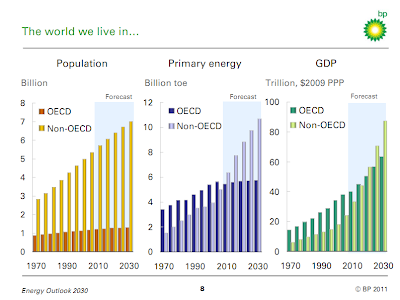In the last January BP, one of the world’s leading energy company, has presented its new report on the Energy Outlook 2030. This amazingly interesting (!) document about long-term energy trends is a great source of information, even though the predictions themselves are not very likely to become true.
What are the most powerful driving forces behind the demand for energy?
The factors behind the demand for energy are:
1. Population growth:
(Since 1990 world population has more than quadrupled!)
2. Income growth (predicted to grow at factor of 25%)
The world’s real income is likely to rise by 100% over the next 20 years.
3. Global integration and globalisation
(higher trade, travel and transport rates)
What is interesting, according to the report, the energy consumption for transport is going to decline in the OECD countries.
4. Industrialisation, urbanisation and motorisation, causing further technology improvements and innovations.
Polish coal resources and production
5. Energy policies (the promotion of energy efficiency or different kinds of regulations fighting the climate change)
What assumptions are made about growth rates in OECD and non-OECD countries?
The global primary energy consumption is predicted to grow by 39% with an average annual growth of 1,7% (in the two previous decades it was 1,9%)., but according to the report, developed countries this rate would be ONLY 6%. Non-OECD energy consumption would account for 93% of global energy growth (now it is 50%). That means that emerging economies are seen driving energy demand.
Why does the report forecast virtually no increase in energy demand in developed countries?
It is mainly due to the fact, that in developed countries there is a much slower population growth accompanied with strict environmental policies. Moreover, the process of industrialisation in these countries is over, so there is no big need for more energy.
What factors would lead to a substitution of sustainable energy sources for fossil fuels? What would determine the size of such substitution?
1. Innovations and technology development
2. Implementing further environmental policies and possibly international agreements
3. Higher costs of fossil fuels
4. A shortage of any of fossil fuels
The size of such substitution would be determined by the amount of time of these changes (processes) and the prices of these substitutions.
GOOD TO KNOW:
Oil is expected to be the slowest-growing fuel over the next 20 years, while natural gas is likely to become the fastest-growing fossil fuel.
What is the role of the price elasticity of demand for and supply of oil and the income elasticity of demand for oil in determining oil consumption in different parts of the world?
Often the demand for energy is price-inelastic, because there is no direct substitution (f.g, most of the produced cars need oil and even if the price goes up, people will still buy it). The biggest problem with oil is, that it is supplied mainly by OPEC countries, who can easily control prices and the volume supplied. If the income goes up there is bigger demand for energy, because people can buy more and want to increase their level of life (easy to see in the emerging countries of Asia)
Why may high energy prices not necessarily mean ‘doom’?
They could work as an incentive to innovation, finding and investing in new sources of energy (shale gas) and, most obviously, would cause people to use and buy less energy with a positive effect on environment.
(The recently made available US Department of Energy report revealed that the largest reserves of shale gas in Europe are in Poland!)
People can (and always will) argue about the reliability of these kind of reports. In my opinion, the most important thing is that it is a good possibility for a wider debate on energy issues. But…
Are we able to predict the future in any way?
“In 1894, a columnist in The Times estimated that such was the growth in horse-drawn carriages that in 50 years every street in London would be buried under nine feet of manure. Some of today's extrapolations for energy use look equally ridiculous. We do not have to rely on a technological breakthrough as significant as the internal combustion engine to save us from being buried in manure.”
That’s what I think.
MANU





Widziałem cie wczoraj przed bridge'm ale cie nie chcieli wpuścić. :P
ReplyDeleteObejrzy mój blog :)
(Since 1990 world population has more than quadrupled!) - are you sure about that? Give me evidence
ReplyDeleteI was surprised to. http://www.bp.com/sectiongenericarticle800.do?categoryId=9037134&contentId=7068677
ReplyDeleteRead the BP report.
p.9
"Since 1900 world population
has more than quadrupled" :)